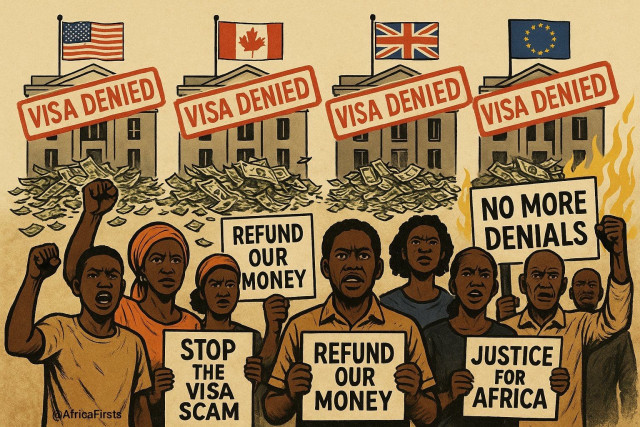The Brief
• Africa lost over €56 million in non-refundable Schengen visa fees in 2023 alone.
• Nearly 700,000 Africans were denied entry most of them after paying €80–€90 in application fees.
• The issue has triggered fierce backlash, with critics calling the system a modern extraction scheme and demanding refunds, reform, and continental self-reliance.
ACCRA — A growing storm of criticism is engulfing European and Western visa policies as African nations lose staggering sums to non-refundable visa fees. In 2023 alone, African applicants paid over €56 million to Schengen countries for visa applications that were denied a figure that jumped to over €60 million in 2024. The United Kingdom also collected an estimated £50.7 million from denied African visa applications. Critics are calling this system a “modern extraction scheme,” prompting demands for reforms, refunds, and a deeper rethink of Africa’s relationship with the West.
A Costly Gate That Rarely Opens
Schengen visa rejection rates in Africa hovered near 50% in 2023, the highest globally. Nigerians, for instance, faced a 45.9% rejection rate in 2024, losing over €4.5 million to Schengen countries and £2 million to the UK in application fees. Comoros had the highest rejection rate on the continent at 62.8%.
Application fees, which rose to €90 for the EU and £127 for the UK in 2024, are non-refundable. These are compounded by indirect costs like document preparation, travel to consulates, and often non-refundable bookings. Applicants carry a heavy burden and often receive no clear justification when rejected.
Despite embassy arguments that fees cover administrative costs, critics argue the policy is exploitative, especially given the scale of rejection and its disproportionate impact on African nations.
A Broader System of "Reverse Remittance"
The financial toll, dubbed “reverse remittances,” transfers millions from lower-income African nations to wealthy Western treasuries. Visa denials not only drain resources but also hinder opportunities in business, education, healthcare, and diplomacy.
African applicants are reportedly twice as likely to be rejected for Schengen visas as Asian applicants. Some EU nations have been accused of using visa approvals as leverage in migration negotiations with African countries raising further ethical concerns.
The U.S. visa system has faced similar criticisms. In Tanzania, applicants for tourist and student visas pay up to $185 or more, with additional charges like SEVIS and fraud prevention fees. If rejection rates mirror those in neighbouring Kenya (42%), the embassy still collects substantial revenue from failed applications.
Political and Public Backlash Intensifies
Outrage is surging online and among African leaders. Zambian President Hakainde Hichilema has condemned the policy as “economic injustice,” and lawmakers in Cameroon and Nigeria are advocating reciprocal visa policies. Moroccan legislators have demanded refunds for rejected Schengen applications.
Social media platforms like LinkedIn have become battlegrounds for the debate. Commentators decry the system’s moral failures, calling it “scamming on a global scale,” and urge Africa to turn inward, fix governance, and build alternatives.
“Our money moves without borders, but our people face walls,” wrote one commentator. Another added, “The best revenge is to fix Africa.”
Others call for radical change from making visa fees refundable upon denial, to charging only on approval, to instituting visa-free policies for Western travellers into Africa. Cameroon, for example, already allows most Europeans to enter without visas.
Paths to Reform and Resistance
Change may come incrementally. Proposals include:
-
Transparent rejection reasons.
-
Refund policies.
-
Legal challenges, as in the case of Cameroonian Jean Mboulé, who sued France and won compensation.
-
Diplomatic pressure by African blocs like the African Union.
Still, Western resistance is strong. Visa policies remain key tools in migration control. Countries argue that the fees deter frivolous applications and fund costly security processes.
But public sentiment is shifting. Even some European voices acknowledge that current practices risk eroding diplomatic goodwill and Europe’s “soft power” in Africa.
Beyond Borders: Dignity and Development
At heart, this debate touches more than finances it strikes at dignity and agency. Many see the system as reflective of a world order that continues to extract from the Global South under the guise of policy. In response, calls for continental self-reliance grow louder.
“Create your opportunity at home. Abroad should be a network, not a must,” said one commenter.
With African nations demanding reciprocity and reform, the visa debate could shape a broader shift toward a more balanced, equitable global engagement or further entrench divisions.




















